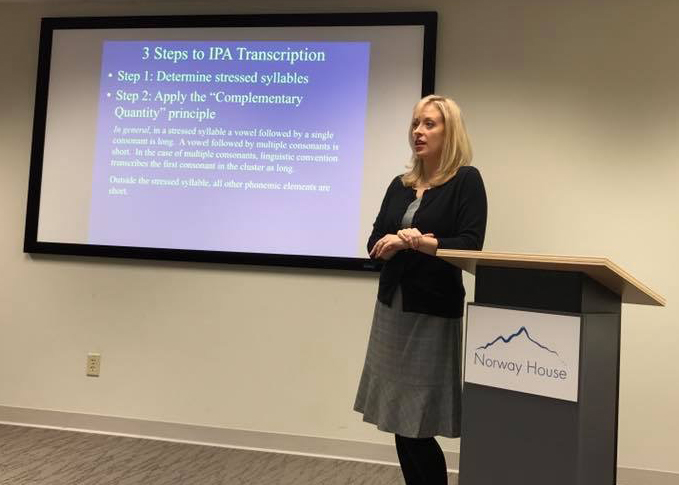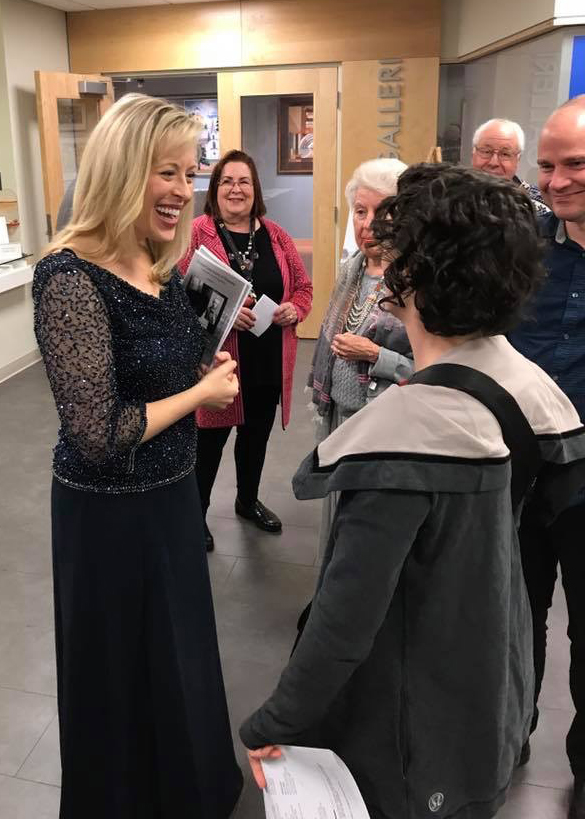What's New > Anna Hersey presents Scandinavian repertoire you'll love to learn
 |
Anna Hersey
|
Scandinavian diction specialist Anna Hersey brings the gorgeous singing repertoire of Scandinavia to an accessible level at the NATS 2019 Summer Workshop, sponsored by the RCM Certificate Program. Anna has provided an overview of what to expect from her sessions. We invite you to take part and branch out to new areas of language study.
Read more about Anna Hersey
and the other workshop presenters.
CLICK HERE FOR REGISTRATION.
Can you fill us in on some of the key takeaways from your presentations?
I will introduce attendees to the classical vocal repertoire of Sweden, Norway, Denmark, and Finland. Although I will focus on the major composers from these countries (Stenhammar, Grieg, Heise, Sibelius, and others), I will also touch on some lesser-known composers like Agathe Backer-Grøndahl, who has been called “the Clara Schumann of Norway.” There will be something for everyone – from songs appropriate for high school singers to those usually sung by graduate-level/professional singers.
 Once you have heard some repertoire you would love to learn or assign to your students, I’ll demystify the pronunciation of Swedish, Norwegian, and Danish in the diction session. One of the unique aspects of Swedish and Norwegian is called “complementary quantity.” That sounds really intimidating, but if you can get a handle on the concept, it makes phonetic transcription of those two languages quite straightforward. We’ll also tackle Danish, typically the most difficult of the three continental Scandinavian languages; by the time you leave you’ll be able to expertly pronounce “rødgrød med fløde” – a tongue twister used to test non-Danes on their pronunciation!
Once you have heard some repertoire you would love to learn or assign to your students, I’ll demystify the pronunciation of Swedish, Norwegian, and Danish in the diction session. One of the unique aspects of Swedish and Norwegian is called “complementary quantity.” That sounds really intimidating, but if you can get a handle on the concept, it makes phonetic transcription of those two languages quite straightforward. We’ll also tackle Danish, typically the most difficult of the three continental Scandinavian languages; by the time you leave you’ll be able to expertly pronounce “rødgrød med fløde” – a tongue twister used to test non-Danes on their pronunciation!
If I am a lyric diction teacher, and I’m attending the workshop, what sort of new perspectives will I gain, so that I could say I was really glad I took part in the workshop.
I think it’s important for all of us as diction teachers to branch out and study languages outside of our “comfort zone.” We are proficient in English, German, Italian, and French diction, and often familiar with the pronunciation of additional languages as well. Sometimes we lose sight of what it was like to be a high school or college student and to be thrown into an entirely new phonetic system. Studying a new language, whatever it may be, can help us empathize with our students, and remember that process of getting our articulators to form new sounds.
The rhythm of the Scandinavian languages and the juxtaposition of contrasting vowel sounds can be challenging. Swedish in particular has the largest vowel inventory of any known language. So if you can master Swedish, you can master anything!
Are there any humorous or particularly fond recollections that led you to becoming a specialist on teaching diction?
I learned to speak Italian during several study abroad experiences as an undergraduate. I realized the importance of specificity and accuracy of pronunciation – one wrong vowel and you may find yourself inadvertently swearing at someone!
Would any of the subject matter relate to teaching CCM?
There’s so much great Swedish CCM repertoire that is largely unknown in North America. The best example that comes to mind is the original musical Kristina från Duvemåla by Björn Ulvaeus and Benny Andersson (yes, of ABBA fame!). The title role was created by Helen Sjöholm, and her performance on the original cast recording is stunning – a gold standard for healthy belting. She’s a great model for young singers, and many of her songs from the show are approachable for young singers. Some of the other roles in that show – Robert and Ulrika – sing great songs as well.
How would the subject matter relate to those who teach in an independent studio?
 The Scandinavian repertoire is so varied – there’s something approachable for every voice type and level, regardless of the place in which you teach. In some ways you have more flexibility with repertoire as an independent studio teacher, without the requirement restraints of juries, etc. that are often imposed in higher education. This can open the door to exploration of repertoire in languages outside of the “big four.”
The Scandinavian repertoire is so varied – there’s something approachable for every voice type and level, regardless of the place in which you teach. In some ways you have more flexibility with repertoire as an independent studio teacher, without the requirement restraints of juries, etc. that are often imposed in higher education. This can open the door to exploration of repertoire in languages outside of the “big four.”
Are there other thoughts you’d like to add about the workshop?
I enjoy the relatively intimate setting of the NATS Winter and Summer Workshops – it’s a great venue for meeting colleagues and sharing the experiences of our profession. I love the fact that this workshop is focused on lyric diction, which is my absolute favorite subject to teach!
Photos are from a recent lecture/recital given by Anna Hersey for the Grieg Foundation.
CLICK HERE for more about the 2019 NATS Summer Workshop, sponsored by the Royal Conservatory of Music (RCM) Certificate Program.

